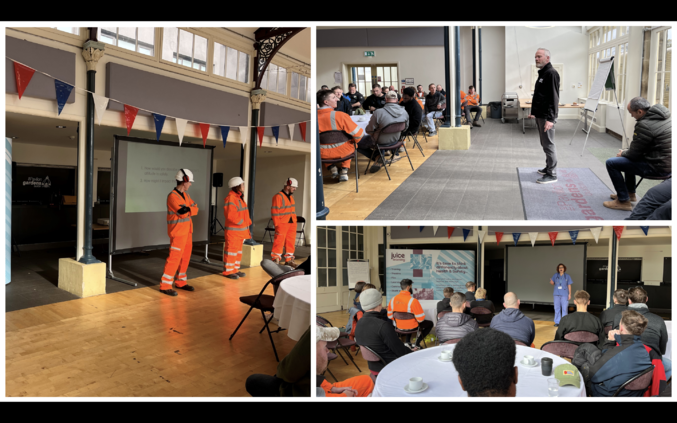Commitment over Compliance



Well, in their wisdom, Juice Learning have thrown me right in at the deep end since my start with them from September. I’ve been up and down the country facilitating Behavioural Health and Safety workshops to scores of people. It was a great change of scene then, when Morgan asked if I’d like to observe a short workshop that he was leading for one of our clients, Tarmac. A great opportunity for me to see one of our sessions from the perspective of a delegate.
At Juice Learning we meet hundreds of people every week who regularly maintain the balance of productivity and safety, day in and day out. From Construction to Energy, Housing to Healthcare, we hear from experts across a wide variety of industries and yet the question from our clients is often the same.
“How do we achieve Commitment, rather than just Compliance?”
Tarmac, like many of our clients, recognise that safety isn’t just about protocol and procedure. These are important, but there must also be a culture of ownership and accountability. A sense of wanting to work safely, rather than just having to in order to avoid repercussion. Everyone wants to get home after a hard day’s work and, even in industries where Risk is an inherent part of the job, injury, or worse, shouldn’t be something we accept as a given aspect of our roles.
In this week’s session with Tarmac, delegates were quick to point out the need for regular communication, feedback between parties, in order to close gaps in peoples’ knowledge or understanding. When people talk, they can empathise. When we empathise, we begin to care. This creates another powerful element in our efforts to work safely: Trust.
Trust is essential if we are to rely on our colleagues to ‘step in’ when they feel we are putting ourselves, or others at risk. We must also trust that when we raise a concern, the concern will be heard and acted upon.
At Juice we use bespoke theatre to give context to our discussions. By using actors we are able to share credible, relatable characters and scenarios with delegates as we hold a mirror up to their organisation. This helps create a safe space in which to discuss attitudes, behaviours, ideas, or opinions.
Following the dramatic scenes we presented to the delegates from Tarmac, it became apparent that they had very clear insight as to where errors sat, and who was responsible. We allow delegates to speak directly to our characters, using a technique called Hot-Seating. Delegates are able to ask questions or challenge the behaviours of each character while also being encouraged to try to see things from a variety of perspectives. Many of those in attendance voiced opinions along the lines of “well he’s a liability for a start!” and “she (our Shift Manager character) needs to give clearer direction.” No criticism of rules or regulations, procedure, or protocol. The overwhelming opinion in the room was that a lack of safety, in the vast majority of situations, is a people problem. Ultimately, when there is a sense of complacency, lack of accountability or inconsistency of approach, trust can break down and communication begins to fail.
The delegates from Tarmac were keen to highlight the value in listening to each other. Recognising that safety isn’t just about making sure people don’t get hurt. It’s about creating an appropriate culture where people are not only accountable but are recognised for their contribution also. The benefits of this are wide reaching as we know. Better staff retention, ease of recruitment, greater diversity, and ultimately improved reputation.
PPE, Lock Out procedures, appropriate Maintenance, Safety guidelines, are all essential elements of a safe working environment. But community is also key. The safest organisations are those with Interdependent cultures; “I have your back and I trust you to have mine”. A sense that, not only do we know we must work safely, but that we understand why, and therefore choose to. Cultures where the guidelines or rules echo that which we would do instinctively to protect ourselves, our teams, our organisation.
Having watched the workshop from a more objective position, I’m reminded that this is what we do well at Juice Learning. We help create time and space for organisations to have these conversations away from the day-to-day pressures of the job. We drill down into the ‘why’ and the ‘how’ of things, so that teams can remind themselves not only of their responsibilities, but of why they choose to work safely in the first place. But perhaps more importantly, what they can do to empower themselves to do just that.
